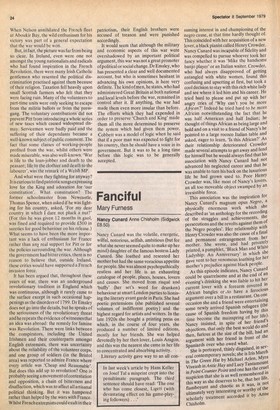Fanciful
Mary Furness
Nancy Cunard Anne Chisholm (Sidgwick £8.50) Nancy Cunard was the volatile, energetic, wilful, notorious, selfish, ambitious (but for what she never seemed quite to make up her mind) daughter of the famous hostess Lady Cunard. She loathed and resented her mother but had the same voracious appetite for people. She was almost psychopathically restless and her life is an exhausting catalogue of people, places, houses, lovers and causes. She moved from risque and 'Indy' (her set's word for drunken) behaviour at smart London parties to lionis. ing the literary avant garde in Paris. She had poetic pretensions (she published several volumes of indifferent poetry) and the highest regard for artists and writers. In the late 1920s she bought a printing press on which, in the course of four years, she produced a number of limited editions, mostly for her friends. She was helped devotedly by her then lover, Louis Aragon, and this was the nearest she came in her life to concentrated and absorbing activity.
Literary activity gave way to an all con suming interest in and championing of the negro cause, at that time hardly thought of. This coincided with her acquisition of a new lover, a black pianist called Henry Crowder. Nancy Cunard was incapable of fidelity and was compelled to pursue whoever took her fancy whether it was 'Mike the handsome banjo player' or an Italian waiter. Crowder, who had always disapproved of getting entangled with white women, found this confusing and upsetting at first, but took a cool decision to stay with this rich white lady and see where it led him and his career. He tried hard to please and put up with her angry cries of 'Why can't you be more African?' Indeed he tried hard to be more African notwithstanding the fact that he was half American and half Indian; he thought of things African as being large and bold and on a visit to a friend of Nancy's he pointed to a large rococo Italian table and asked, eager to learn, 'Is this African?' As their relationship deteriorated Crowder made several attempts to get away and fend for himself but he would always find that his association with Nancy Cunard had not advanced his neglected career and that he was unable to turn his back on the luxurious life he had grown used to. Poor Henry Crowder was, like most of Nancy's lovers, an all too moveable object swamped by an irresistible force. This association was the inspiration for Nancy Cunard's magnum opus Negro, a physically enormous work which she described as 'an anthology for the recording of the struggles and achievements, the persecutions and the revolts against them of the Negro peoples'. Her relationship with Henry Crowder was also the cause of a final and permanent estrangement from her mother. She wrote, and had privately printed, a pamphlet, 'Black Man and White Ladyship: An Anniversary' in which she gave vent to her venomous loathing for her mother's prejudice against black people. As this episode indicates, Nancy Cunard could be quarrelsome and at the end of an evening's drinking she was liable to hit her current lover with a forearm covered in African bangles or 1to have a ferocious argument over a bill in a restaurant. On one occasion she and a friend were entertaining some newly arrived Spanish refugees (the cause of Spanish freedom having by this time become the mainspring of her life). Nancy insisted, in spite of her friend's objections, that only the best would do and then, furious at the size of the bill, had an argument with her friend in front of the Spaniards over who owed what. She is portrayed, thinly disguised, in several contemporary novels; she is Iris March in The Green Hat by Michael Aclen, Myra Viveash in Antic Hay and Lucy Tantamount in Point Counter Point and one has the cruel suspicion that she is as well remembered in this way as she deserves to be, that her life, i i flamboyant and chaotic as it was, s not ultimately very interesting or worthy of the scholarly treatment accorded it by Anne Chisholm.


































 Previous page
Previous page